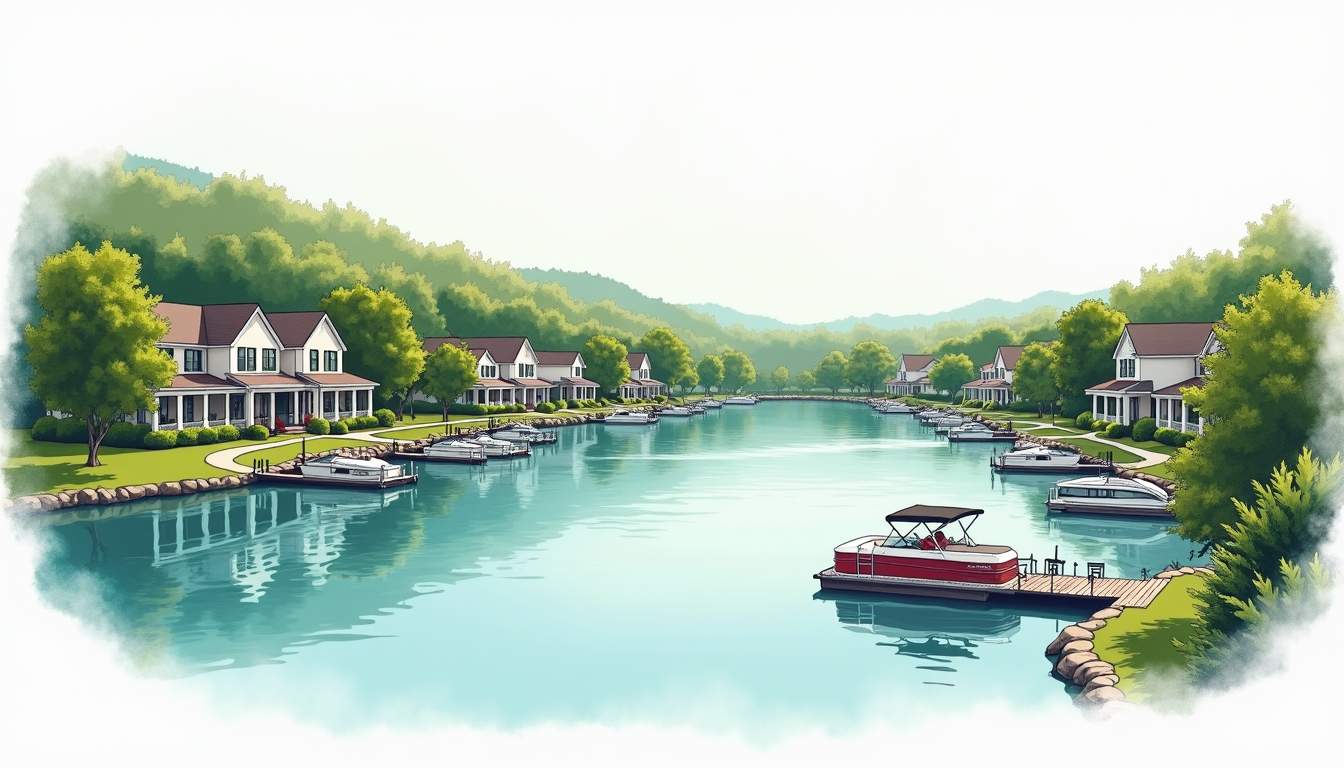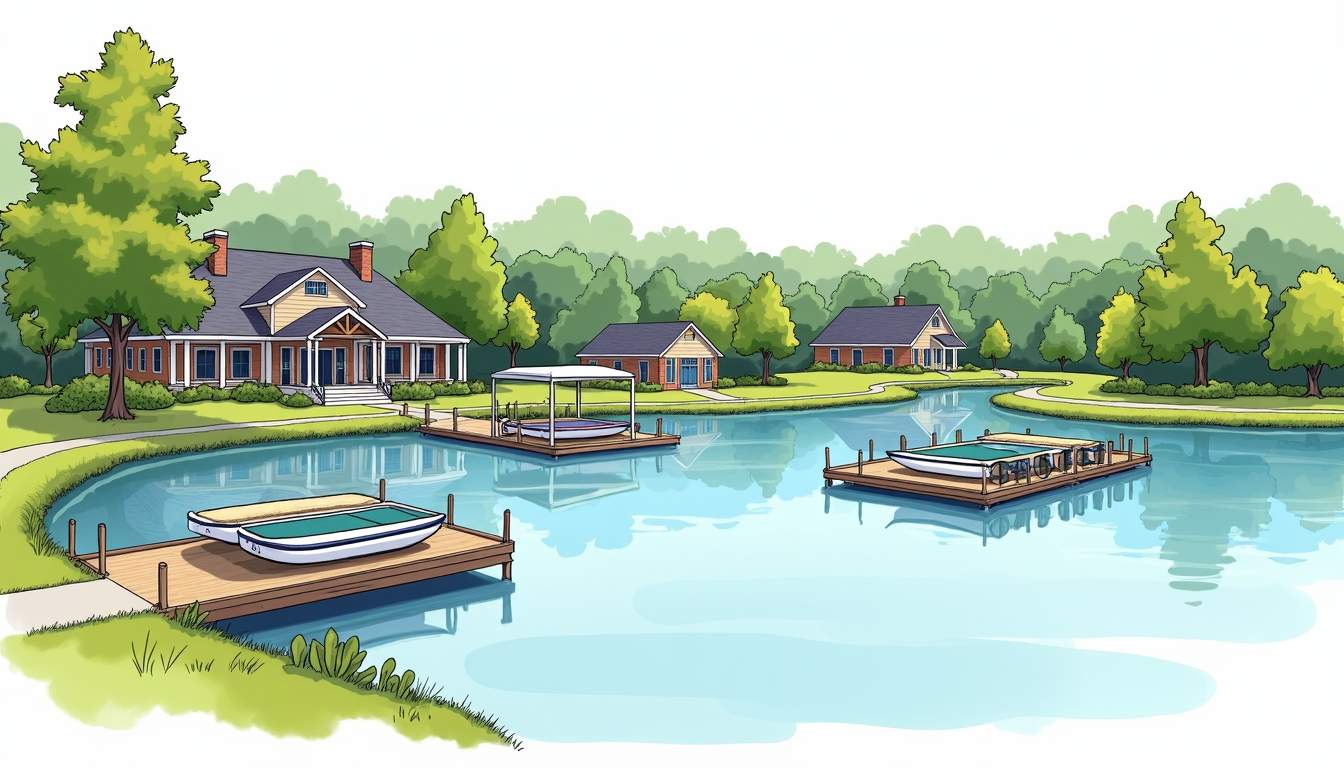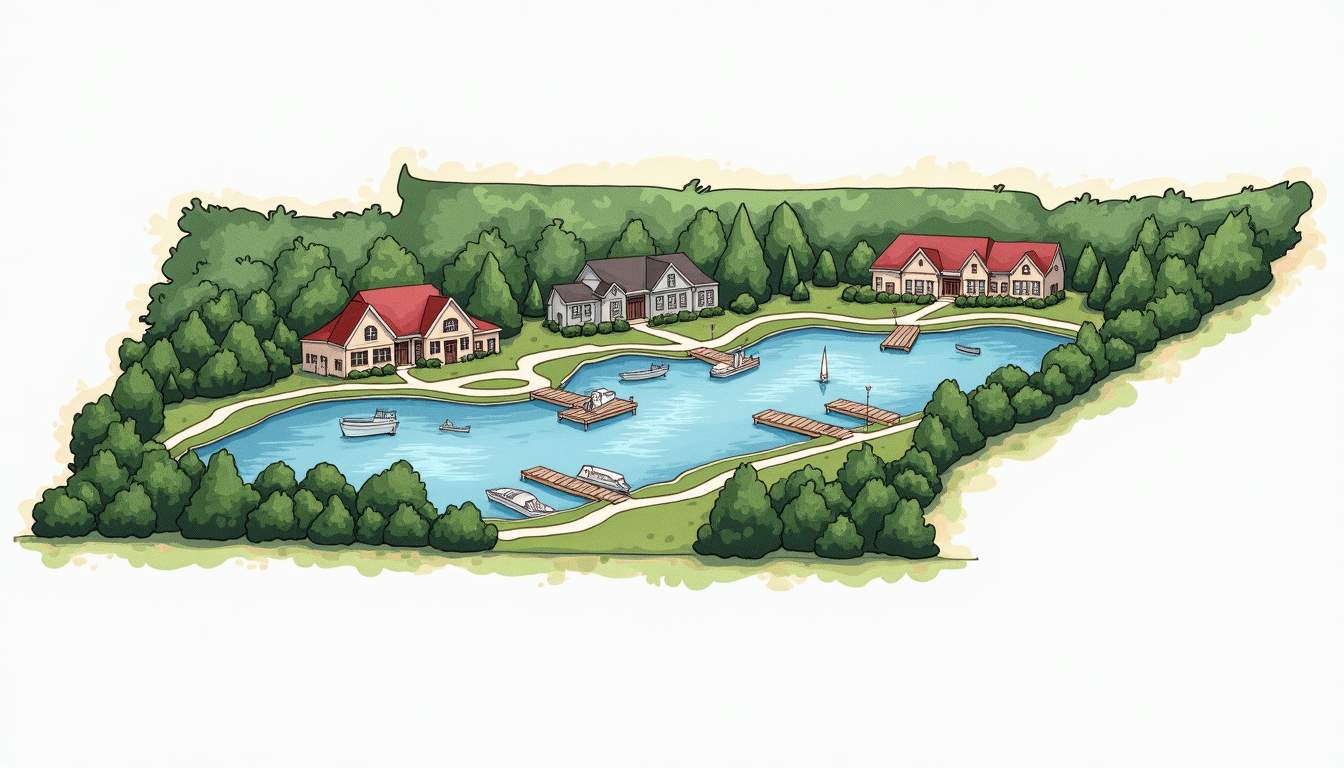
Buying gated real estate centered on boating amenities in Tennessee combines lifestyle aspirations with practical considerations. This guide walks through the neighborhoods, amenities, legalities, and financial realities that matter most to buyers seeking a private, waterfront-oriented lifestyle in the Volunteer State. Whether evaluating lakeside communities on the Tennessee River, Chickamauga Lake, or one of the many impoundments and reservoirs, this resource covers key steps to find a property that fits both boating habits and long-term investment goals.
Gated communities designed around boating offer a blend of security, shared amenities, and waterside access that appeals to a range of buyers: weekend boaters, retirees, and families who want an active outdoor lifestyle. Tennessee’s large lakes and river systems provide reliable recreation, and many communities are built with docks, boat slips, and marinas as central features.
Beyond the obvious pleasures of waterfront living, these communities frequently include features that improve convenience and protect property values: gated entrances, homeowner associations (HOAs) with established maintenance plans, private beaches, clubhouses, and community events. For many buyers, the combination of privacy and boater-friendly infrastructure is a strong draw.
In addition to boating amenities, many of these communities are situated near scenic hiking trails, golf courses, and local dining options, making them destinations for both relaxation and recreation. The integration of natural beauty with modern comforts fosters a tight-knit atmosphere where neighbors share common interests, enhancing the sense of community. This lifestyle appeal can often translate into strong resale value and a rewarding ownership experience.
Furthermore, the accessibility of Tennessee’s central location allows residents to easily reach major cities like Nashville, Knoxville, and Chattanooga, blending small-town tranquility with urban convenience. Whether it’s early morning fishing trips or lakeside social gatherings, boating-focused gated communities in Tennessee offer an unmatched balance of activity, security, and scenic enjoyment that attracts a diverse and enthusiastic group of homeowners.
Communities vary widely. Some are full-service developments centered on an on-site marina with fuel, boat maintenance, and seasonal slip rentals. Others emphasize small private docks, shared launch ramps, or dry-stack storage. The scale and services directly affect HOA dues, resale potential, and day-to-day convenience.
Additionally, property types range from single-family lakeside homes and upscale cottages to townhomes and condo-style units in resort-like settings. Some gated neighborhoods sit on large tracts with deep-water access and walking trails, while others are clustered along shorelines with coves and canal-style channels designed to maximize dock space.
Waterfront lots provide direct shore ownership and the potential for private docks, but they command higher prices and can carry stricter permitting and erosion-control requirements. Water-access homes, which enjoy community docks or shared slips, tend to cost less upfront and may reduce maintenance obligations. Choosing between them depends on budget, the desire for private dock control, and willingness to manage shoreline upkeep.
Not all boating communities are created equal. Prioritize features that align with boating habits and lifestyle goals. A deep-water marina with year-round fuel and ice service is essential for frequent boaters. Slip ownership or long-term lease options provide security and convenience. For weekend boaters, a well-maintained launch ramp and guest slips may be sufficient.

Community amenities beyond boating can influence daily enjoyment and long-term value. Look for secure storage for trailers and equipment, on-site repair facilities or preferred service providers, covered slips to protect vessels, and easy shoreline access. Recreational extras — fitness centers, pools, hiking paths, and dining venues — also contribute to a vibrant community atmosphere.
Carefully review HOA documents for dock rules, slip allocation, maintenance responsibilities, and any limitations on boat size, motor type, or overnight docking. Some communities restrict commercial or rental use of slips, while others require adherence to specific dock designs. Understanding who handles seawall and dock repairs is crucial, as these can become significant expenses over time.
Geography influences boating conditions, community style, and property prices. The Tennessee River system, including Watts Bar and Chickamauga reservoirs, offers expansive boater playgrounds and many gated communities catering to active water users. East Tennessee’s lakes tend to have dramatic shorelines and hilly terrain, while Middle and West Tennessee provide broader flat shoreline and larger marina developments.

Proximity to urban centers matters for services and resale. Communities within an hour of Nashville, Knoxville, Chattanooga, or Memphis provide easier access to airports, medical facilities, and dining, which can appeal to full-time residents and seasonal owners alike. Remote locations offer seclusion but may reduce convenience for part-time occupants.
Reservoirs and managed lakes experience seasonal variations in water level based on dam operations, rainfall, and evaporation. Confirm historical water-level stability and any planned infrastructure projects that might affect future shorelines. Some areas have better year-round boating due to steady flow and larger basins, while others may restrict navigation during maintenance or drought conditions.
HOA rules in gated boating communities cover lot use, dock policies, architectural approvals, and sometimes even the types of boats or trailers permitted. While rules help maintain community aesthetics and property values, overly restrictive covenants can stifle personalization or business use (for example, short-term rentals).
Secure a full set of HOA documents early in the buying process: covenants, conditions, and restrictions (CC&Rs), bylaws, financial statements, and meeting minutes. These reveal ongoing assessments, reserve fund health, pending litigation, and any planned capital improvements. A well-capitalized HOA with transparent governance typically provides better long-term stability.
Look for a reserve fund sufficient to cover major repairs, a reasonable delinquency rate among homeowners, and recent special assessments that might indicate deferred maintenance. Annual budgets should itemize marina upkeep, landscaping, security, and insurance. If the HOA repeatedly relies on special assessments, future costs could be unpredictable.
Shoreline development often requires permits from state agencies, local authorities, and possibly the U.S. Army Corps of Engineers. Erosion control, septic systems, and protected wetlands can constrain construction and dock placement. Buyers should request copies of any existing permits and confirm whether future projects will need re-application or mitigation measures.
Environmental protections can be a benefit as well, preserving natural buffers and water quality that enhance boating experiences. However, these protections may limit expansion or private shoreline modifications, so balancing environmental stewardship with personal desires is essential.
Properties around lakes and rivers frequently rely on septic systems, which require periodic maintenance and sometimes upgrades when lots are developed or sold. Evaluate site drainage patterns and potential for runoff to affect shoreline health. Erosion-control measures and professionally designed shorelines can prevent costly repairs while keeping the waterfront usable.
Purchase price is only one component of cost. Add HOA dues, marina slip fees, property taxes, shoreline maintenance, and potential boat-lift or dock insurance. Boat-related insurance often requires separate policies that cover liability, hull damage, and slip-related risks. Flood insurance might be advisable even on lakeshore properties, so obtain quotes before committing.

Financing can differ for waterfront properties and for slips. Mortgages for primary residences follow typical underwriting guidelines, but loans on vacant waterfront lots or second homes may require larger down payments and higher interest rates. Some lenders are unfamiliar with marina-related valuations; using regional lenders experienced with boater communities can smooth the process.
Boating-focused gated communities often hold value due to limited waterfront inventory and desirable amenities. Yet market momentum depends on local demand, accessibility, and broader economic factors. Properties tied to specific marinas or with unique dock configurations may have narrower buyer pools, so consider flexibility — for instance, a home with both private dock capability and community access can appeal to more buyers.
Begin with a clear list of non-negotiable boating features (e.g., slip size, fuel access, deep water). Tour multiple communities at different times of day and week to assess noise, traffic, and activity levels. Request a thorough property inspection that includes docks, seawalls, and any mechanical boat infrastructure.
Engage professionals who understand boating properties: real estate agents with waterfront experience, surveyors familiar with riparian boundaries, marine contractors for dock evaluations, and environmental specialists for erosion or septic concerns. These experts reveal hidden costs and clarify long-term responsibilities tied to waterfront ownership.
Use contingencies tied to marina assessments, HOA disclosures, and a dock/seawall inspection report. If a property includes a slip, confirm transferability and any fees. Negotiate repairs or credits for identified maintenance needs, and include a clear timeline for title transfer of any marina-related assets.
Living in a gated boating community blends convenience with shared community rhythms. On busy summer weekends, marina traffic and community facilities can be lively; quieter months may mean limited on-site services. Consider monthly schedules and whether on-site staff availability aligns with boating plans.
Storage solutions are important: covered slips, dry storage, trailer parking, and winterization services can all affect convenience. Similarly, community culture — whether social, activity-focused, or quietly residential — impacts satisfaction. Choose a neighborhood that matches the desired balance between social engagement and privacy.
Investigate emergency response times for medical, fire, and water-rescue services. Some gated communities maintain private security or emergency plans for docked boats and waterfront incidents. Establish a personal checklist for mooring during storms, winterizing, and securing valuables to reduce risk and maintain vessel condition year-round.
Boating-focused gated real estate in Tennessee offers an attractive lifestyle for those who prioritize water access, security, and community amenities. The romantic notion of lakeside sunsets and easy launch days is best paired with practical due diligence: reviewing HOA finances and rules, verifying marina arrangements, assessing environmental constraints, and estimating ongoing costs.
With careful planning, professional guidance, and clear priorities, buyers can find a waterfront gated community in Tennessee that delivers both the boating lifestyle imagined and sound long-term value.
Ready to embrace the boating lifestyle you've envisioned? Tennessee National offers an exceptional gated community experience with a private marina, waterfront dining, and over 20 member amenities set against stunning Tennessee scenery. Whether you seek a move-in ready home or a custom build near boating-friendly waters, our premier lifestyle caters to all your needs. Schedule a Private Tour today and start creating lasting memories at Tennessee National.